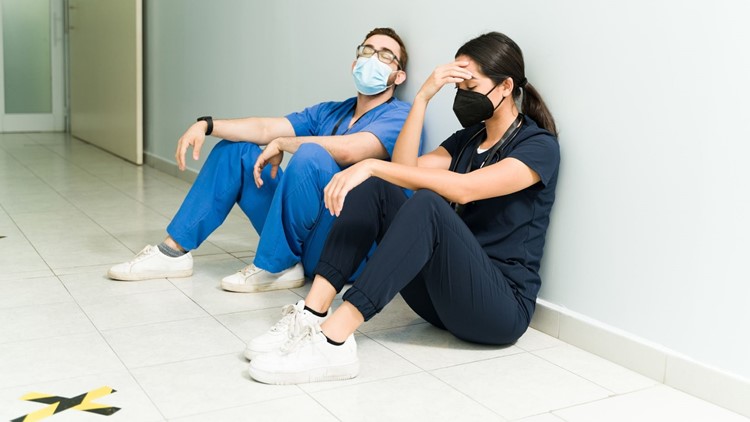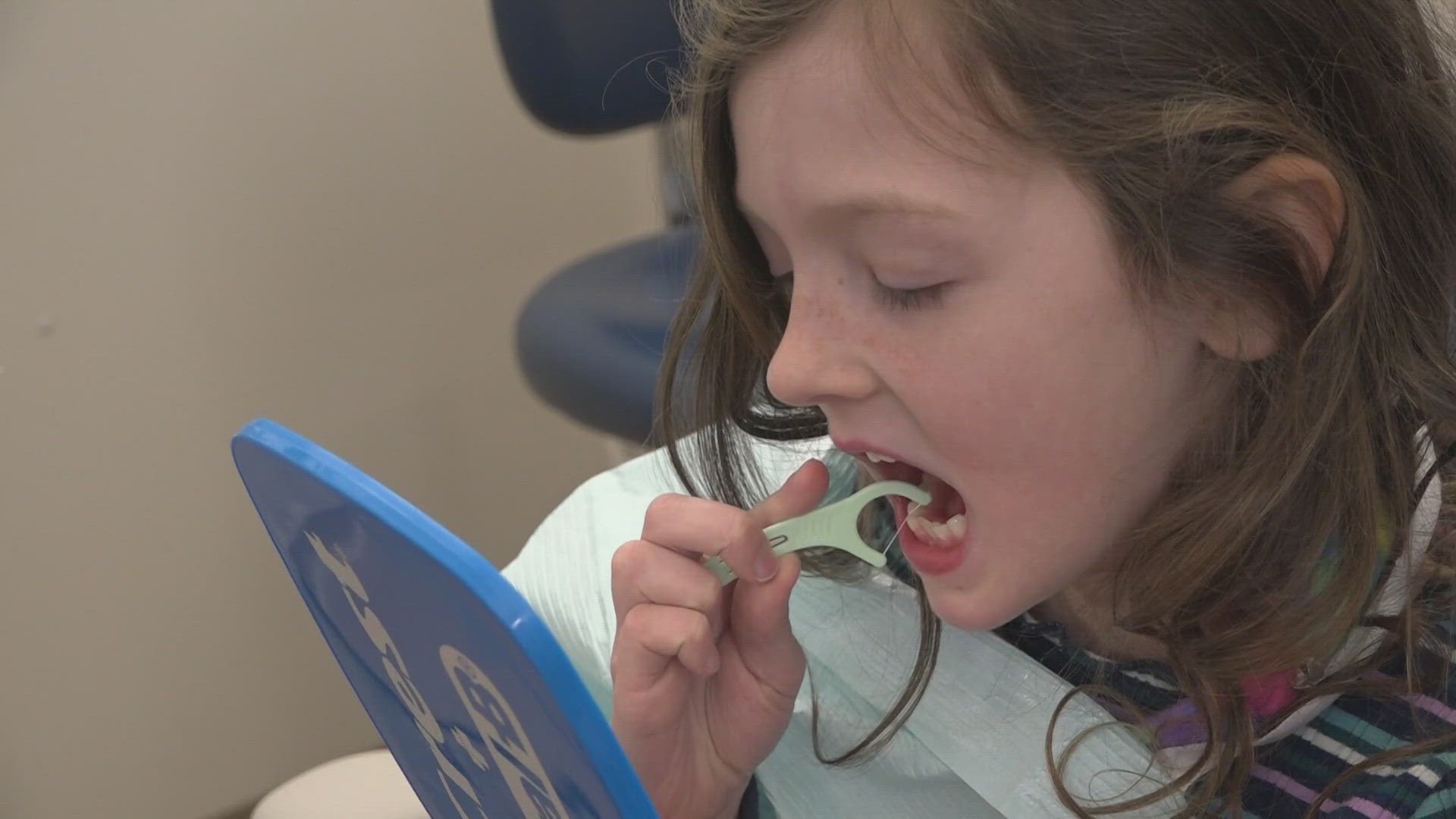MAINE, USA — More than 120 Maine doctors, nurses and other healthcare professionals entered a substance use and mental health monitoring program in 2021, part of a steady increase over the past three years, according to a new state report.
While they make up a small percentage of the overall workforce, the rising number of professionals in the program comes at a time of exhausting demands on healthcare workers during the pandemic, and also reflects rising substance misuse across the population as a whole.
Records reviewed by The Maine Monitor show the cases ranged from a doctor showing up to a hospital drunk to a nurse attempting to get a prescription under a family member’s name.
Guy Cousins, director of the Medical Professionals Health Program, said the increased number of professionals entering the intervention program reflects greater education and outreach to lower the stigma around drug and alcohol misuse, and the support needed to treat the conditions.
The Medical Professionals Health Program is part of the Maine Medical Association and contracts with state licensing boards to provide mental health support and randomized toxicology tests.
“Our mission is really to safeguard the public and to help medical professionals be able to practice at their highest level of care,” Cousins said.
Last year, 123 Maine healthcare professionals were referred to the MPHP for the first time — a nearly 10% increase from 112 in 2019. And Cousins expects this year could continue that trend.
New participants included 57 nurses, 39 doctors of medicine, 12 pharmacists, 10 dentists, four doctors of osteopathic medicine and one veterinarian.
The professionals can be referred to the program by someone, required to attend by a licensing board or voluntarily enroll.
The number of self-referred participants has ticked up slightly over the past three years. Cousins said this represents successful outreach about the program and declining stigma as our understanding of substance use disorders improves.
More people could enter the program, he said, if the pandemic starts to slow down and health professionals have time to catch their breath and think about reaching out for support.
The health professionals in the program make up a very small percentage of the total healthcare workforce in Maine. For example, the 57 nurses being monitored by MPHP make up less than 0.2% of the 32,000 licensees with the Maine Board of Nursing.
However, it’s important to provide support for professionals who have behavior that might compromise their ability to provide the highest level of care, Cousins said.
Last year, 21 nurses were sanctioned by the nursing board for incidents involving drug or alcohol use, according to a review by The Maine Monitor of disciplinary documents.
In one case, a nurse took oxycodone pills while at work. Another was noticeably drunk. And another nurse withdrew a prescription under a patient’s name.
In a similar review of disciplinary actions taken by the Maine Board of Licensure in Medicine, seven physicians and physician assistants were sanctioned related to drug or alcohol use last year. One physician arrived drunk when he was called into the hospital. Another met a patient outside work and received drugs from them.
Experts estimate that 10-15% of the general population struggles with substance misuse. And the pandemic has exacerbated those numbers.
The proportion can be higher for healthcare professionals, Cousins said. Doctors, nurses and other healthcare workers deal with their patients’ physical, psychological and emotional pain, sometimes with very little break. During the COVID-19 pandemic, especially, there has been higher demand, higher velocity of care, fewer resources and a shrinking workforce.
They’re also working in settings with access to drugs.
“There’s sometimes that projected expectation that the other person on the other side doesn’t have any problems when in fact they’ve got families, they’ve got relationships, they’ve got jobs, they’ve got job stressors, they’ve got job challenges,” Cousins said.
Participants may be monitored for multiple years, depending on individual situations. In 2021, there were 264 active participants in the MPHP program and 54 completed the program.
Last year, 127 participants underwent toxicology testing and seven were monitored for alcohol.
Medical professionals are, rightly, held to a high ethical standard, Cousins said. But it’s important to remember they are human and fallible. The expectation of perfection is unachievable and unfair, he said.
“If we’re going to put them on a shelf or put them in this idealistic place, that’s a setup,” Cousins said. “That’s a setup for expectations definitely not getting met.”
Stigma also creates barriers for people seeking help, he said. Science around substance use disorders has evolved in recent years, but many still fear getting labeled and negative impacts on their careers if they seek help.
Healthcare workers can seek help from the monitoring program confidentially.
The Board of Nursing also can mandate someone to complete the program. It is required to investigate any complaint it receives. If a violation of the Nurse Practice Act related to substance or alcohol misuse is found, the board offers the licensee a consent agreement that may include monitoring. The licensee can sign the agreement or request a hearing, after which the board issues a decision and order. The licensee can appeal that decision in district court.
A nurse is allowed to keep practicing while being monitored so long as the probation terms are followed, said Kim Esquibel, executive director of the state Board of Nursing. Upon completing the agreement, a nurse can petition the board to terminate the probation.
“The board’s goal is to allow them to continue to practice safely in a monitoring program,” Esquibel said. “They give them the opportunity to continue to have a livelihood and continue to practice, as long as they’re practicing safely and being monitored.”
The state Board of Licensure in Medicine follows a similar model for physicians. The board investigates a complaint and may schedule a hearing, offer a consent agreement or refer the case to district court.
The board’s mission is to protect the public, said its executive director, Dennis Smith. It does not provide direct health care services, but supports physicians and physician assistants “through education, raising awareness, annual financial support to the MPHP, free continuing medical education, and when necessary through directed and structured remedial action required by a decision and order or consent agreement.”
The pandemic highlighted the need to emphasize self-care among nursing students as a preventative measure, said Brenda Petersen, associate dean of the School of Nursing at the University of Southern Maine.
Students learn about substance misuse and the process with the nursing board. But resiliency practices need to be embedded in the lessons so nurses learn how to navigate tough situations to avoid falling into self-medicating practices, she said.
That’s especially true during the pandemic, when health professionals grappled with “moral injury,” that goes beyond burnout, Petersen said.
“Moral injury” is a term used to describe how someone deals with right and wrong.
“In order for moral injury to occur, the individual must feel like a transgression occurred and that they or someone else crossed a line with respect to their moral beliefs. Guilt, shame, disgust and anger are some of the hallmark reactions of moral injury,” according to the U.S. Department of Veterans Affairs.
“The pandemic has shown us that we need to do a better job of really preparing nurses for all the things that we know they need as part of that skill set, and that includes how they’re truly engaged in self-care,” Petersen said.
Petersen said she’s trying to build a culture of accountability where colleagues ask each other directly what they did that day for self-care.
“We have a shortage of nurses who are able to endure the environment, the stresses and all that comes with that. We have an obligation, from the education side, to teach our nurses how to manage that stress so we can keep our caregivers strong.”
This story was originally published by The Maine Monitor. The Maine Monitor is a local journalism product published by The Maine Center for Public Interest Reporting, a nonpartisan and nonprofit civic news organization.



